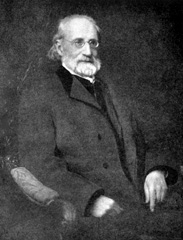
Quick Facts
Biography
Andrew Jackson Davis (August 11, 1826 – January 13, 1910) was an American Spiritualist, born in Blooming Grove, New York.
Early years
He had little education, though probably much more than he and his friends pretended. In 1843 he heard lectures in Poughkeepsie on animal magnetism, as the phenomena of hypnotism was then termed, and found that he had remarkable clairvoyant powers. In the following year he had, he said, spiritual messages telling him of his life work. He eventually became known as "the Poughkeepsie Seer".

Work
For the next three years (1844–1847) he practised magnetic healing with much success; and in 1847 he published The Principles of Nature, Her Divine Revelations, and a Voice to Mankind, which in 1845 he had dictated while in a trance to his scribe, William Fishbough. He lectured with little success and returned to writing (or dictating ) books, publishing about 30 in all including:
- The Great Harmonia (1850–1861), an encyclopaedia in six volumes;
- The Philosophy of Special Providences (1850), which with its evident rehash of old arguments against special providences and miracles would seem to show that Davis' inspiration was literary;
- The Magic Staff: an Autobiography (1857), which was supplemented by Arabula: or the Divine Guest, Containing a New Collection of New Gospels (1867), the gospels being those according to St Confucius, St John (G.Whittier),St Gabriel (Derzhavin),St Octavius (Frothingham), St Gerrit (Smith), St Emma (Hardinge), St Ralph (W. Emerson), St Selden (J. Finney), St Theodore (Parker) and others;
- A Stellar Key to the Summer Land (1868);
- Tale of a Physician, or, the Seeds and Fruits of Crime (1869) Internet Archive; online edition (pdf format, 22 MB, entire book on one pdf);
- Views of Our Heavenly Home (1878), each with illustrative diagrams and The Fountain with Jets of New Meanings (1870) Illustrated published by McCrea & Miller.
Influences and legacy
Davis was much influenced by Swedenborg and by the Shakers, who reprinted his panegyric praising Ann Lee in the official work, Sketch of Shakers and Shakerism (1884).
In writing his 1845 short story "The Facts in the Case of M. Valdemar", Edgar Allan Poe was informed by Davis's early work after having attended one of his lectures on mesmerism.
Davis's complete library is now housed within the Edgar Cayce Library. Davis coined the term "law of attraction".
Critical reception
Regarding Davis' book The Principles of Nature, Joseph McCabe has noted "There is no need to examine the book seriously. The scientific errors and crudities of it release any person from considering whether there was any element of revelation in it... Moreover, Davis was a palpable cheat. He maintained that up to that date he had read only one book in his life, and that book was a novel. We know from his admirers that this was not true, and any person can recognize in his pages a very crude and badly digested mess of early scientific literature."
The spiritualist writings of Davis have been criticized by scientists and skeptics for containing inaccuracies and false information. For example, in one case, Davis seemed unaware that water is a compound of oxygen and hydrogen. Researcher Georgess McHargue pointed out that the supposed "scientific" passages from his writings are filled with "gobbledegook as to put it in the class with the most imaginative vintage science fantasy."

